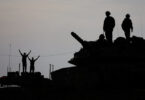Yossi Mekelberg
To argue that utter malaise has spread across Israeli society would be an understatement in light of the deep rifts and fragmentation that have taken hold of it. This is probably the greatest threat Israel currently faces, much of it cynically orchestrated by Prime Minister Benjamin Netanyahu.
This may sound like a precarious argument only a fortnight after Iran launched 350 drones and missiles at Israel, while the war in Gaza has not ended and the hostilities with Hezbollah on the Lebanon border have only intensified – but please bear with me. These conflicts only highlight the fact that the Israeli experiment in state and nation-building has hit an extremely bumpy road.
Wars tend to conceal differences in society and, for a short time after Oct. 7, Israeli society came together, partly due to shock and trauma, but also because the need to respond required putting differences aside. However, it soon became apparent that the people in power who had brought this calamity upon Israel, above all the prime minister, were arrogantly refusing to take responsibility. And, as time elapsed, they began audaciously blaming the liberal and progressive forces that they conveniently and derogatorily call the “left” (the Israeli right’s code word for “traitors”) for the country’s lack of war preparedness.
This meant the default lines were clearly marked between the defenders of Israel as a liberal democracy and those in the current coalition government who are determined that the country become a democracy in name only and to live by the sword in perpetuity. The intensity of the events of the last six months might have quickly suppressed the memory of the months leading up to Oct. 7, when regular mass demonstrations took place in Israel. These protests galvanized the progressive-liberal forces into resisting attempts by the newly formed sixth, and hopefully last, Netanyahu government – comprised of some of the most ultranationalist, messianic and religious elements in Israeli politics – to weaken the independence of the judiciary in an attempt to ensure that the government and its activities would not be subjected to its scrutiny.
It was a clear assault on the principles of checks and balances and the separation of powers, which are the pillars of any liberal democracy. When coalition members in the Knesset and the Cabinet were warned about these objectionable actions, which legitimize bad governance and corruption and make a mockery of accountable government, they shrugged it off. Instead, they embarked on venomous attacks on their critics and increasingly unleashed police violence against the protesters.
In its ignorance and bigotry, this coalition government refuses to understand that, without an independent judiciary, Israel as a state, politicians and members of the security forces would long ago have faced international courts for the acts they committed in the Occupied Territories after 1967. The early days of the present war found Israel united in grief and a determination to go after Hamas. But grief is a powerful emotion that, on this occasion, led to an overwhelming, soul-destroying desire for revenge, which distorted strategic thinking and consequently inflicted indiscriminate killing and destruction upon Gaza.
Israel’s unity was to be short-lived and followed by widespread criticism, even anger, at the government’s failure to avert the Hamas attack and for not prioritizing the release of the hostages. Consistently, polls now suggest that voters are longing for new leadership, although this does not mean a shift in support toward the left or to the peace camp; in fact, many would support a move in exactly the opposite direction. Every day provides further evidence that the current government is stuffed with self-serving and corrupt, not to mention incompetent, ministers. Hence, despite the continuing war in Gaza and the ever-present danger of escalating clashes with Iran and its proxies, protests have returned to the streets of Israel.
This time, the uniting theme is to demand the release of the hostages and for the government to take responsibility for the worst six months in the country’s history and resign, in spite of Netanyahu’s desire to see out the entire term of this Knesset until late 2026. His desperate attempts to cling to power for at least the duration of his corruption trial eclipses any other considerations. To achieve this, he and his supporters are prepared to intimidate witnesses and prosecutors, attack protesters – including family members of the hostages – both verbally and physically and prolong the war, while claiming that there is no time for elections or an investigation into the Oct. 7 failures while the country is embroiled in a multifront conflict.
But nothing could be further from the truth. Fresh elections and a state commission to investigate the failures of Oct. 7, which left 1,200 people dead and 250 taken hostage, are vital steps for Israel to take in order to begin a healing process and liberate itself from the current wretched government. The protesters are rightly demanding truth and accountability.
And it is worth recalling that the current prime minister is someone who, together with other senior members of his then-government, was last month found by a state commission to be personally responsible for the 2021 Mount Meron disaster, which claimed the lives of 45 men and children during a crush at a public religious celebration. Needless to say, Netanyahu has not apologized or taken responsibility for that either. Instead, he was busy trying to persuade the state to pay for the renovation of his private home’s swimming pool or, in his cowardice, hiding on the night of Iran’s recent attack in his billionaire friend’s nuclear bunker. At the same time, most Israelis do not have access to any kind of shelter from incoming missiles and drones. However, the most powerful demonstration of his government’s moral bankruptcy and inability to achieve the objectives it set for itself is the unscrupulous attack on the families of the hostages. If there is a cause that unites those who oppose this government regardless of their political persuasion, it is the deep conviction that Israel should have been unwavering in its commitment to the release of the hostages. In this litmus test of the covenant between a people and their government, the latter has failed, deliberately and cynically so. For this, above almost everything else, ordinary citizens in Israel cannot forgive Netanyahu and his government and are demanding their removal.







